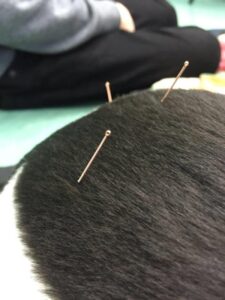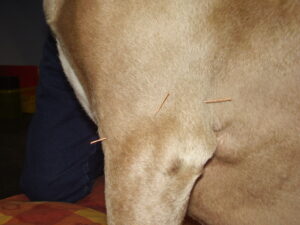What is acupuncture?
Acupuncture is one of the oldest forms of Chinese Medicine and has been successfully for over 4000 years. It is a technique for treating pain by inserting fine needles into particular points in the skin and muscle. There are two broad approaches to acupuncture. The Western approach to acupuncture describes pain pathways in the brain and spinal cord being modified, and the changes stimulated in the central nervous system, activate the body’s natural pain blocking systems. Acupuncture therefore helps where there is chronic pain, and also restores health and homeostasis by modifying circulation, hormones, and the respiratory and immune systems. Traditional Chinese Medicine describes using acupuncture points located along neurovascular pathways to address imbalances in “Qi”.
WESTERN APPROACH:
Local effect: Myofascial trigger points(tender points in muscle) and taut muscle bands may be needled locally, causing local changes in blood flow. This releases muscle spasm and also may help with referred pain from that point.
Segmental effect: Needles are used in the same spinal segment to treat musculoskeletal pain eg back pain or visceral (organ) pain eg bowel disease. This helps to manage pain and modulate organ function
Extrasegmental effect:This is a more generalised effect of needling and involves the release of endorphins and seratonin via descending pain inhibition pathways,from the central nervous system
TRADITIONAL CHINESE MEDICINE:
TCM views disease as an imbalance within the animal and looks at both internal and external factors that influence disease. This is a more holistic approach, and health is restored by needling certain acupuncture points to restore equilibrium and health. Five Elements, Eight Principles and Yin-Yang theory are included in the TCM appproach.
Conditions that respond to acupuncture include musculoskeletal (muscle and bone pain), neurological conditions, and organ problems :
-
Arthritis
-
Back/spinal Pain, disc disease and spondylosis
-
Hip and elbow dysplasia
- Lumbosacral disease
-
Neurological pain/nerve damage/paralysis/FCE
-
Urinary and faecal incontinence/retention
-
Chronic bowel disease (IBS)
-
Chronic respiratory disease
-
Lick granulomas
 What to expect in the consult and how will your animal respond?
What to expect in the consult and how will your animal respond?
I will have requested a full medical history from your own vets and related health professionals (eg physiotherapist). The initial consultation will involve further history taking and a gait evaluation and examination. I will then insert up to 25 acupuncture needles which are fine, solid and pre-sterilised. They are relatively painless to insert and once placed, most animals become very relaxed or even fall asleep during treatment. This may last for 24-48 hours after treatment. A session usually last around half an hour, but needles sometimes only stay in for a few minutes, depending on the animal and the condition being treated. Sometimes electro-acupuncture may be used, where a mild electric current is used to provide extra stimulation and this causes a mild tingling sensation at that point. The frequency of treatment varies but usually treatments are initially weekly-2 weekly to effect, and then monthly top-ups are given as required. I will provide a report for your vet (and physiotherapist if required) after the initial consultation, and they will be kept updated via email or phone.

